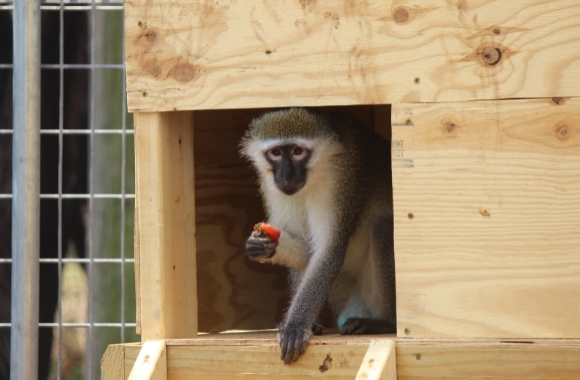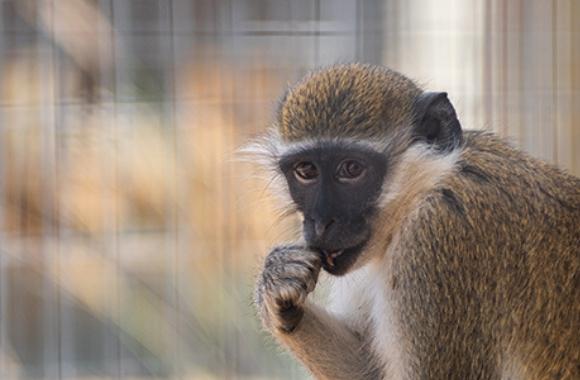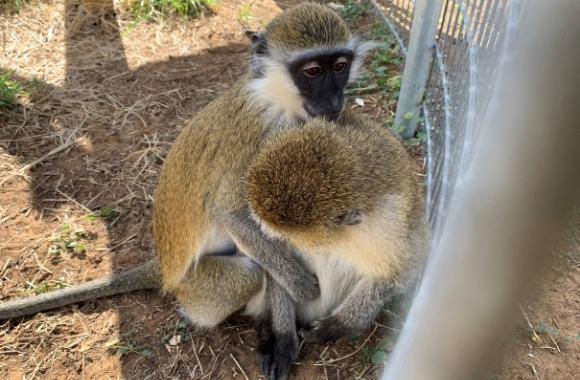During the summer of 2021, we welcomed three new arrivals to the sanctuary and were in discussions to bring our final rescue of the year home in September. Gambit the rhesus macaque had been kept as a pet in Las Vegas; Kiki the vervet was caged as a pet in Dallas; Maliki the vervet had bitten his owner in Indiana and needed rehoming urgently; and Picassa the baboon was languishing in a defunct pseudo sanctuary in California. We built new enclosures for those who needed them, and shifted current residents around to make way for the others. Logistics were organized, fundraising was carried out, paperwork was completed and, one-by-one, our new friends arrived.
A Tragic Loss

Everything was going well, but then tragedy struck. Maliki, who had appeared completely healthy, passed away suddenly. Necropsy showed that he had a long-standing, previously undiagnosed heart defect. He was just five years old and had his whole life ahead of him. We were heartbroken and his new enclosure, built just for him, sat quietly empty.
Welcoming Willis
Then, in September, we received a call. A young vervet, little more than a baby at just three years old, had been confiscated in Chicago. He was being held by Animal Control, had already escaped his cage once, and the staff – who had no experience dealing with wild animals – were desperate for us to take him.
I don’t know what would have become of Willis if we had been unable to give him a home. Few sanctuaries accept vervet monkeys and all of those that do were at capacity, including us. That is, apart from that sad empty space left by Maliki. It seemed like fate. And so, it was that, just 48 hours after we learned he existed, I picked Willis up from the airport in Austin to drive him to his forever home at the sanctuary.

Willis was taken from his mother at just a few months, or perhaps even weeks, old. He was kept alone, illegally, as a pet for three long years in a city environment that could not be further than his natural habitat. He had nothing that a young monkey should have and so it was hardly surprising that, when I pulled back the fabric covering the door of his transport crate that day at the airport, he was spinning in circles and ricocheting from one side of the space to another – a clear sign of stress. I was deeply concerned for his welfare and worried that he had been damaged psychologically by his traumatic start to life.
But, as soon as little Willis had had his health check on arrival and he was let out into his large enclosure, I was disabused of my concerns. While stories like Maliki’s weigh heavy on us, stories like Willis’ bring us unending joy.
To say Willis was excited about his new home is an understatement. He was everywhere at once. Exploring, running, jumping, swinging, and climbing. He was vying to get the attention of his vervet neighbors – peeking out at them from his hammock and then, if they looked his way, performing dramatic leaps and jumps with his mouth open wide to show he wanted to play. He loves food, toys, sticks, stones, hammocks, sunshine, his sleeping box, his teddy bears… in fact we are yet to find something that Willis is not excited about. More than anything, though, Willis loves to play. He can make a game out of absolutely anything!
Helping Willis Make Friends
After he had been through his two week quarantine period and we were sure he did not have any illnesses that could be passed to his neighbors, it was time for him to meet the other vervets. Socializing new monkeys is always a little nerve-wracking. If they have not learned proper social cues in their childhood, they often do not know how to behave with other monkeys and this can get them in trouble – even resulting in injury if a higher-ranking monkey puts the new arrival in their place.

Normally, when we first introduce monkeys, they skirt around each other a little and, if it goes really well, they may end up playing briefly or grooming one another. But Willis did something that I had never seen before. We began by introducing him to Bouf – an elderly female vervet who is tolerant of newcomers. Willis ran straight over to her and wrapped his arms around her from behind. It took us a moment to realize that he had positioned himself in the way that a baby would with their mother as they rode on her back in their very early months. There was something so sad in that moment – Willis was so desperate for the security that he had ripped from him so young, and he was seeking it in his new friends. Bouf was slightly bemused by the little monkey’s unusual greeting, but she allowed him to stay there and “hug it out”. Since then, Willis has meet the rest of the vervet gang and has brought his sweet, playful energy to the small troop. While his start to life was bleak, his future looks increasingly bright. We look forward to updating you on his antics as he continues to settle into his forever home here in south Texas.
Keep Wildlife in the Wild,
Liz
